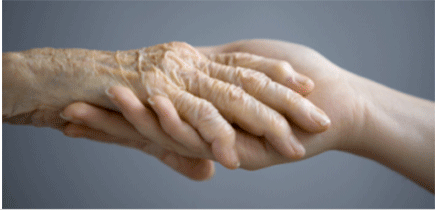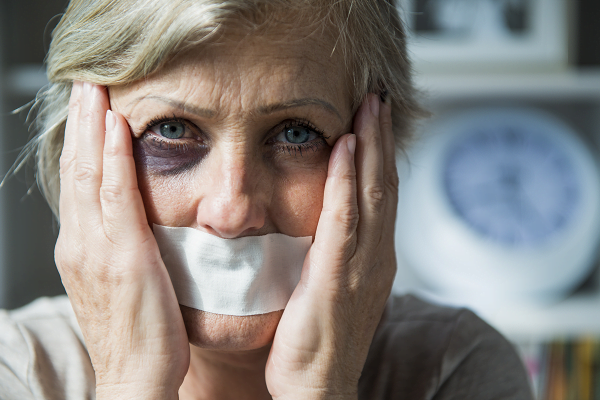Elder abuse can take several forms: it can be physical, sexual, psychological, moral, but also through neglect, be it intentional or not. It also includes extortion (for instance, forcing an older person to sign a cheque against their will), or other forms of financial violence, blackmail, abandonment, grave violations to someone’s dignity, or disrespect.
The World Health Organisation defines elder abuse as “a single, or repeated act, or lack of appropriate action, occurring within any relationship where there is an expectation of trust which causes harm or distress to an older person.” Elder abuse is a violation of Human Rights.
How prevalent is the phenomenon worldwide? How do you spot abuse? And what are different ways to fight it?
How prevalent is elder abuse in the world?
Every month, 1 out of ten older adults experience abuse in the world, the same prevalence as in the USA, where abuse affects 5 million elders every year, as per estimates. Every year, abused elders are over 500,000 in the UK, and 600,000 in France ( 5% of people aged 65 and more and 15% of people aged 75).
Sources: American National Council on Aging, Action on Elder Abuse UK, Alma France.
According to French Fédération 3977 against home-based abuse, 83% of reported cases take place at home. In 2008, the association set up a national phone line against older and disabled adults’ abuse, the 3977, available from Monday to Friday between 9am and 7pm.
Abuse also occurs in care facilities, where they’re most likely to take the form of medical violence or neglect. In 2013, the regional French healthcare agency of the Rhônes-Alpes region received between 80 and 90 reports of “suspected abuse” in social facilities; among them, 15 to 20 were brought to court following State services’ investigation.
While the general public remains largely unaware of the phenomenon, more and more cases manage to make the headlines. Such is the case of late Manhattan socialite Brooke Astor, taken advantage of by her son, who stole from her and forced her to changer her will to his advantage. In France, three retirement home interns were indicted for physically abusing their charges in January 2016; the UK experienced a similar case in January 2014, when three nursing home employees were jailed for mocking and tormenting residents suffering from dementia.
A violation of elders’ dignity
According to specialists, mistreatments are most often the by-product of carelessness. The fact remains that in the most shocking cases of abuse, perpetrators clearly intend to humiliate vulnerable people left in their care.
Elders make ideal targets for cults
As they age, people often grow more isolated; older adults also tend to be unaware of the different forms that financial violence can take. Those characteristics make them ideal targets for cults. In France, the Inter-Ministerial Mission for Vigilance and Combating Sectarian Aberrations (Miviludes) is at the forefront of the fight against cult-related abuse. It has been receiving calls from adults worried about their ageing parents every day for the past few years. “suspicious methods, products and interventions” are also reported daily.
Hervé Machi, former magistrate and General Secretary of the Mission declared that “Those dangerous movements understand that they can easily clean out elderly people’s bank accounts.” Three successive reports alerted public authorities to the increasing hold cults have over the elderly.
Cults manage to find various entryways to care facilities:
- Staff members: some people seek to spread ideologies or methods specific to the movement which they belong to. For instance, some residents were approached by followers of the “Mahikari” movement.
- Directors: they can base their service projects on methods that were not previously approved by public authorities.
- The person’s social circle: friends or family members, who can also act as their tutor or curator.
- Outsiders: volunteers or organisation trying to win residents over to their ideas. For cults, outdoor activities, be them individuals or organised by nursing homes, are an opportunity to get access to residents.
Abuse : what are risk factors ?
Several factors must be taken into account when trying to assess an elderly person’s chances of suffering from one form of abuse or another.
They can be individual factors:
- Poor physical and mental health,
- Alcohol and drug abuse,
- Gender: elderly women are more likely to be victims of mistreatments than men, especially after losing their spouse. Exposure to violence also tend to be more severe and prolonged.
Family factors:
- Cohabitation,
- Family members are financially dependent on the elderly person,
- Tensions within the family: a family member’s impaired autonomy can become a source of distress and heighten them,
- Having to care for an elderly parent while juggling a busy schedule
Community factors:
- Social isolation affecting both carers and the elderly increases risks of abuse.
Spotting the tell-tale signs of abuse
In cases of abuse, several signs should set you thinking. They can be:
Physical :
- Neglected appearance, poor hygiene,
- Clothing is weather-inadequate,
- Unexplained wounds or bruises,
- Excessive use of medication (especially tranquillisers) and alcohol abuse,
- Symptoms of dehydration,
- Repeated falls,
- Frequent hospital stays,
- Complains about insufficient heating or ventilation,
- Unexplained financial difficulties.
Or psychological :
- Symptoms of depression (sleeping disorder, loss of interest, crying, low self-esteem…)
- Signs of fear and distrust
- Abrupt mood swings,
- Suicide attempt or talk of suicide
- Reclusion
- Asking permission before answering questions
- Talk of wanting to leave partner or move out
What can you do upon witnessing or suspecting abuse?
If you are not bound by professional secrecy, you are required to report any abuse on an elderly person, regardless of its nature or gravity. Asking for the victim’s consent is not mandatory if a physical or mental disability leaves them unable to protect themselves. You will also be required to share all information pertaining to mistreatments, including the identity of the perpetrator.
If you are bound by professional secrecy, you are able and required to report it in two cases, without having to reveal the perpetrator’s identity:
- In the event of food or medical deprivation (the elder is denied care they need), or severe abuse,
- If one party is about to commit suicide or make an attempt on somebody’s life
If you live in France:
- Contact a member of the government’s administration (prefect, departmental director for social cohesion, medical inspectors, social workers, etc.) or appeal to a public prosecutor. You can call abuse helpline 3977 for help on choosing the right representative. Good to know: a health professional cannot be penalized for having reported a case of abuse in his establishment.
If you live in the UK :
- Call 999 if someone is in immediate danger.
- Contact the local council if someone is at risk of being abused, or is being mistreated, be it at home, by a carer, or in a care home
- If you’re worried about the wellbeing of an elderly person staying in a hospital of clinic, get in touch with the manager.
- Call Action on Elder Abuse’s helpline 0808 808 8141 if you wish to discuss concerns and get advice.
The importance of awareness-raising and informing the general public
Elder abuse must be the topic of many awareness-raising programmes in order to alert the general public to tell-tale signs of mistreatments and encourage people to report cases they may witness. The World Elder Abuse Awareness Day was created in 2012 by the UN; it is a first step towards making this often-hidden phenomenon more visible.
Communicating about programmes that exist to fight against elder abuse, including certain associations such as les Petits frères des pauvres in France and Action on Elder Abuse in the UK is also crucial.
Senior living facilities are insufficiently staffed
Staff shortage is often mentioned as a decisive factor in cases of abuse. In French living facilities, there is an average of 0.56 staff member for every resident, less than for disabled care, with an average of one staff member for every disabled person.
Staff members are thus often faced with a work overload, leading to stress and exhaustion, which are common breeding ground for abuse.
« We often underestimate the impact of healthcare worker shortage on daily abuse in long-term living facilities. Overworked staff members tend to tie up residents so as not to have to look after them. Healthcare workers also use their heavy workload to justify unmade beds, sometimes stained with faecal matter barely covered with used nappies; cleaning residents in rotation, one day for men and another for women, because they do not have sufficient time per task to wash everyone. Meals turning cold, or standard timetables that do not take residents’ personal habits into account. Everybody is woken up at the same time, everybody goes to sleep at the same time! A general atmosphere of non-respect and disregard settles in, almost without staff members taking notice.” said French psychologist Marie de Hennezel, who wrote the book Concern for others.
Preventing abuse by integrating good practice into staff training
More often than not, care workers do not receive proper training, meaning they often have trouble managing dependent elders, who can prove quite challenging, particularly where mental disorders are involved.
Care workers training must evolve to include good practice in their programmes.
The ANESM published a series of recommendations to fend off elder abuse:
- Improve relationships between residents in their daily lives
- Foster bonding during recreational activities
- Include all staff members in residents’ social lives
- Maintain contact between residents and their loves ones
- Recognize the role of friends and family in supporting residents
- Include other players in the facility’s community life
- Develop other forms of formal collective participation
- Consider residents’ opinions, even outside normal participation frameworks
- Encourage participation of friends and family, as well as associations of residents’ friends and family
- Make it possible for residents to meet their city or village’s other citizens
- Favour the exercise of civil rights
- Acknowledge the role of residents as economic players
Published by the Editorial Staff on



I have to thank you for the efforts you have put in writing
this website. I am hoping to check out the same high-grade content
from you later on as well. In fact, your creative
writing abilities has inspired me to get my own, personal site now 😉
YOU COULD USEFULLY GO INTO THE POSSIBLE CAUSES EG INADEQUATE SUPPORT AND TRAINING FOR CARERS PREVENTION AND FAMIKY CASE STUDIES TO TRAIN SAFE GUARD TEAMS WHO ALMOST CANT IMAGINE THIS HAPPENING